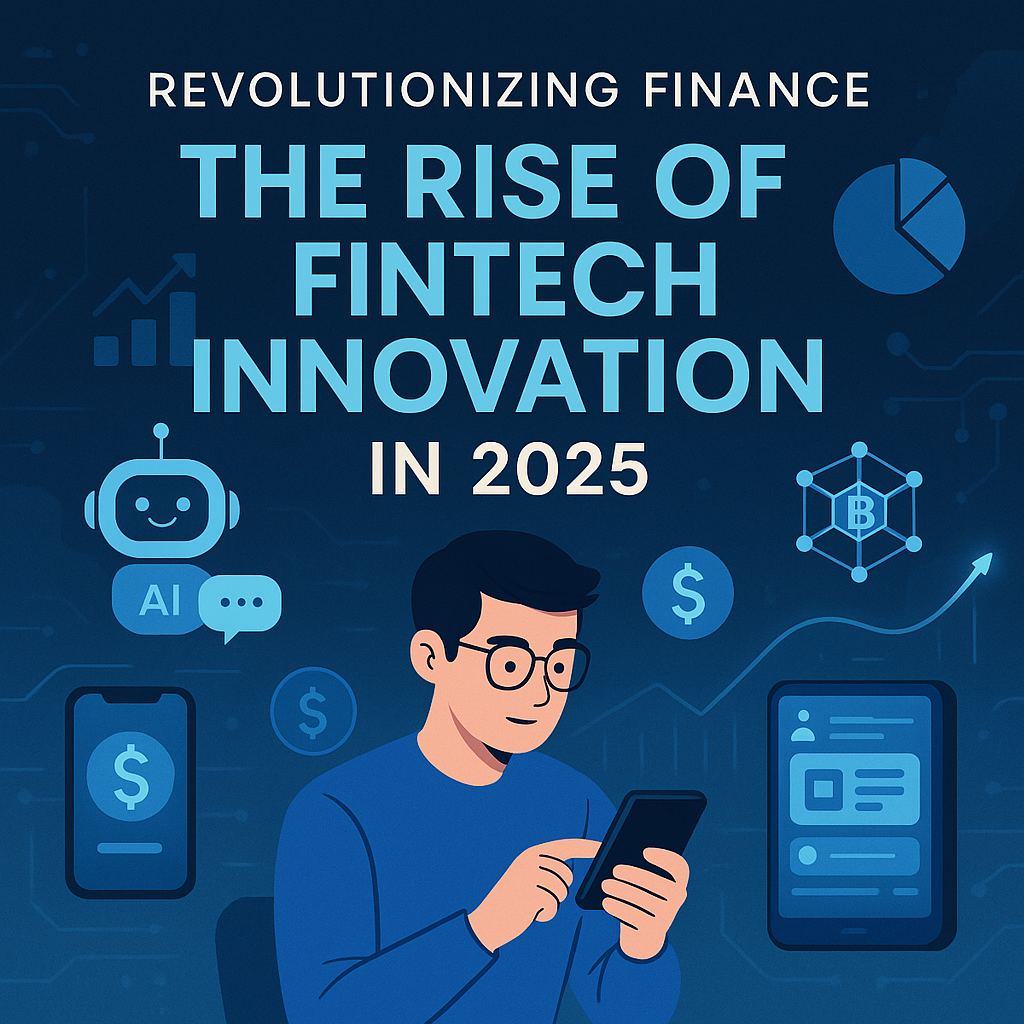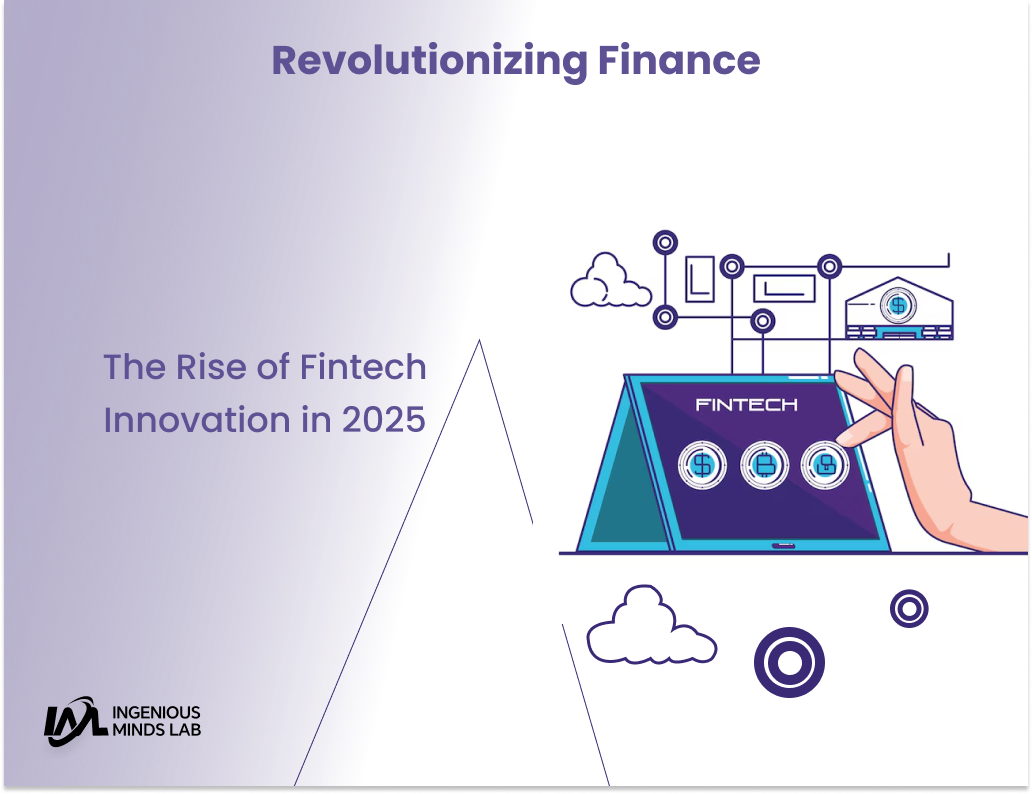Revolutionizing Finance: The Rise of Fintech Innovation in 2025
Introduction
In an age where digital transformation touches every aspect of our lives, the financial sector is undergoing a rapid evolution. The driving force behind this transformation is fintech innovation. From mobile banking and blockchain to AI-powered personal finance tools, it has redefined how consumers and businesses interact with money.
In this blog, we’ll explore how fintech innovation is reshaping the financial world, the key technologies powering it, and what the future holds for this dynamic industry.
What is Fintech Innovation?
Fintech innovation refers to the integration of technology into financial services to improve user experience, efficiency, and accessibility. It includes a broad spectrum of advancements such as:
Mobile payments
Peer-to-peer lending
Robo-advisors
AI-driven fraud detection
Digital wallets and neobanks
These innovations are not just disrupting traditional financial institutions—they are creating a completely new financial ecosystem that is more inclusive, transparent, and responsive.
Why Fintech Innovation Matters in 2025
In 2025, fintech innovation has become more than just a trend—it’s a necessity. Here’s why it’s at the center of global financial strategies:
Consumer Expectations Are Changing
People now expect real-time payments, 24/7 service, and seamless mobile experiences. Fintech companies deliver on this with intuitive apps, AI chatbots, and fast transaction processing.Global Financial Inclusion
Fintech innovation is breaking down barriers. In developing countries, digital wallets and micro-lending apps provide unbanked populations with access to essential financial services.Cost Efficiency
Fintech eliminates the need for physical infrastructure and reduces operational costs, enabling financial institutions to offer better rates and services.Data-Driven Decision Making
Leveraging big data and AI, fintech companies can personalize financial services and provide real-time insights to users and investors alike.

Top Fintech Innovation Trends in 2025
Let’s break down the most influential fintech innovation trends shaping the financial world this year:
1. AI and Machine Learning in Finance
AI is no longer futuristic—it’s foundational. Fintech innovation uses AI for:
Fraud detection and risk assessment
Customer service via chatbots
Predictive analytics for investing
Personalized product recommendations
These tools make finance faster, smarter, and more secure.
2. Blockchain and Decentralized Finance (DeFi)
Blockchain technology is decentralizing everything from banking to insurance. DeFi protocols allow users to:
Lend and borrow without intermediaries
Trade digital assets securely
Maintain transparency through smart contracts
This fintech innovation empowers users with greater control over their financial assets.
3. Embedded Finance
Imagine paying for groceries or getting a loan directly from your e-commerce platform. Integrating financial services into non-financial apps creates a seamless user experience.
4. RegTech (Regulatory Technology)
With the complexity of financial regulations, RegTech tools now include:
Automate compliance checks
Reduce risk of penalties
Monitor transactions for suspicious behavior
This is especially valuable for fintech startups aiming to scale fast and stay compliant.
Fintech Startups Leading Innovation
Here are some global fintech innovators driving transformation in 2025:
Stripe – Simplifying digital payments for businesses of all sizes.
Plaid – Enabling secure financial data sharing across platforms.
Revolut – A neobank offering multi-currency accounts and crypto trading.
Chime – Providing no-fee banking and real-time spending insights.
These companies exemplify the power and potential of fintech innovation when applied strategically.
How Traditional Banks Are Responding
Traditional banks can no longer ignore the wave. Many are:
Partnering with fintech startups
Investing in digital transformation teams
Launching their own neobanks and digital products
Leveraging AI for customer retention and fraud prevention
The collaboration between traditional finance and fintech is leading to a hybrid model, blending security with innovation.
Benefits of Fintech Innovation for Consumers
Fintech innovation isn’t just about shiny apps and crypto wallets—it’s about empowering users. Key benefits include:
Greater Accessibility – Anyone with a smartphone can access banking services.
Lower Costs – Reduced fees for transactions, remittances, and loans.
Financial Literacy Tools – Apps that help users budget, save, and invest.
Transparency – Real-time updates, clear pricing, and no hidden fees.
Challenges Facing Fintech Innovation
Despite rapid growth, it faces several roadblocks:
Cybersecurity Threats
Increased digitization means higher risk of cyberattacks. Fintech companies must invest heavily in security protocols.Regulatory Uncertainty
Global variation in regulations makes it challenging to scale services internationally.Consumer Trust
Many users are still skeptical about entrusting money to tech-first companies. Building trust is critical.Technological Integration
Integrating fintech with legacy systems remains a complex and costly process.
Looking ahead, fintech innovation will likely:
Looking ahead, fintech innovation will likely:
Expand into AI-powered wealth management
Drive cross-border financial services via blockchain
Promote green finance with sustainability scoring tools
Integrate more biometric security measures like facial recognition
Support the growth of CBDCs (Central Bank Digital Currencies)
This evolution will further personalize finance and democratize access.
Final Thoughts
Fintech innovation is more than a buzzword—it’s a fundamental shift in how the world interacts with money. From disrupting traditional banking to enabling financial inclusion, it holds the key to a smarter, faster, and fairer financial future.
Businesses, consumers, and policymakers must stay ahead of the curve to harness the full potential of fintech innovation. Whether you’re an investor, entrepreneur, or just a curious user, understanding this space is essential in 2025 and beyond.

